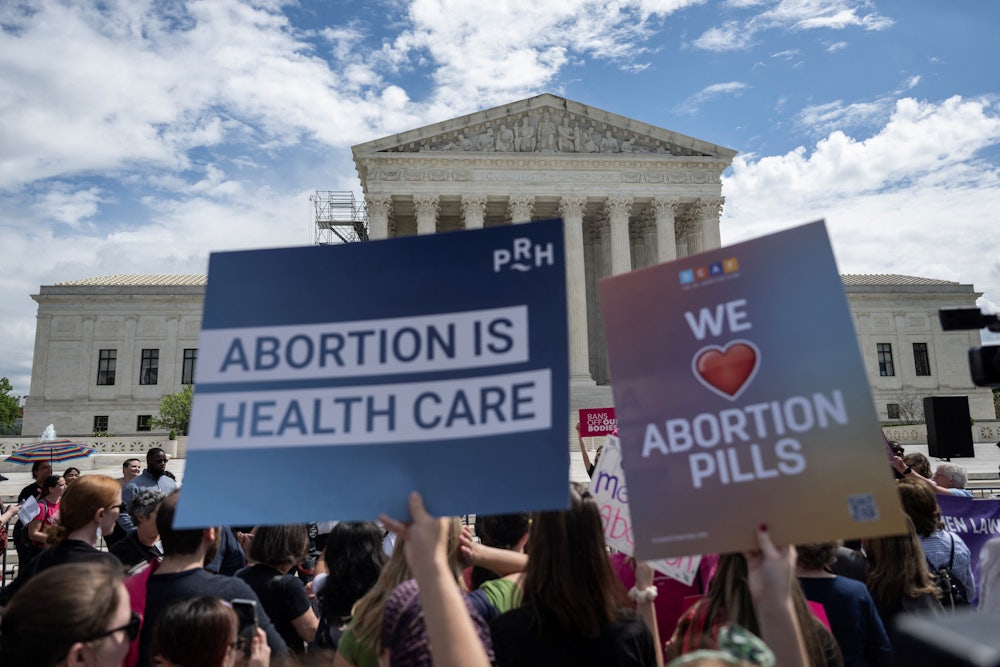Headlines
announced the Supreme Court’s ruling on a case challenging the accessibility of mifepristone
last week as if the court was affirming abortion access. “Supreme Court Ensures, for Now,
Broad Access to Abortion Pill,”
read one. “Supreme Court’s move on abortion
pill in line with majority of Americans,” proclaimed another, referring correctly to polls
showing that most Americans oppose medication abortion bans.
In reality, it was just a procedural ruling: By reversing two lower court decisions that would have restricted access to mifepristone before an outcome in the case, the justices merely said that mail-order mifepristone cannot be prohibited while the court case is still being fought out. It could be months, years, before we get an indication of where the justices really stand on this case, which is likely to land in the Supreme Court’s lap as the appeals process plays out. Meanwhile, abortion services are getting harder and harder to access, as thousands of people seeking an abortion and those helping them—often with only a small or even an all-volunteer staff—try to make sense of these legal shifts.
Most abortion access groups aren’t the large nonprofits whose lobbying arms make them visible in mainstream media. There are the many abortion funds, generally operating state by state to help people pay for their abortion and associated costs. There are also groups like the Online Abortion Resource Squad, who meet people seeking abortion information but who may never have heard of an abortion fund, in the online spaces that they’re already in. And there are the relatively new abortion providers, like Just the Pill, who work in mobile clinics providing services in legal states. Their vision, one medical director told me, “is to expand access, regardless of what’s going on in the country with the laws.”
The Online Abortion Resource Squad was founded in 2019, when Ariella Messing, an abortion fund volunteer and then Ph.D. candidate in bioethics and health policy at Johns Hopkins University, saw that the r/abortion subreddit was an important resource for people seeking abortion information. For some, this subreddit might be the first place they went looking for resources or support, but their experience was dependent on who could answer their queries. So OARS is there, Messing recently told Garnet Henderson at Rewire News, to make sure that “every post had a good answer.”
To date, everyone at OARS is unpaid, with its volunteers working in shifts on the board 24/7. Behind the scenes, its volunteers share information among themselves to try to keep up with the legal challenges. Whenever there’s a big abortion case in the news, OARS volunteer Erin Johnson told me by phone this week, there’s an influx of people coming to the subreddit asking what it means. “This last series of rulings with the [mifepristone] case was particularly challenging,” said Johnson, who also works in reproductive health research, looking at how abortion funds are responding to the Dobbs decision. “We don’t really have anything that we can tell people about long-term access issues. We can tell people what is happening right now—if you need care today, here’s where you can go.” But given the confusion of the case and how long it may go on for, she said, “we can’t help people with the anxiety of two weeks from now, three months from now, six months from now—are they still going to be able to get abortion care?”
Part of the problem is that people may not think about the practical issues of accessing abortion until they need one. Another is that the news that reaches them may not be current, Johnson observed. “People often hear about the ban, but they don’t hear about the stays.” One recent poster was anxious that the mifepristone they had ordered online through an organization would not arrive in time to safely use, Johnson said. The mifepristone and misoprostol pills she ordered were hung up in customs, and the longer they didn’t have them, the more weeks their pregnancy advanced, along with the chance that the misoprostol could degrade before it arrived.* They thought abortion wasn’t legal in their state, Johnson said, but Johnson was able to tell them that the ban had been stayed; that the poster had the option to get mifepristone at a clinic. But by that point, “this person has spent three or four weeks being anxious” and had already spent part of the money that they might otherwise have used getting care in person. These possible bans and the uncertainty they cause, Johnson said, force a person to spend “all this time, money, emotional energy.” So the ongoing legal confusion depletes limited resources, even when bans end up being stayed or reversed.
Clinic staff too are racing to keep up with the court battles while just doing their jobs. Another poster on the subreddit lived in a state where two appointments 24 hours apart are required for a medication abortion. The poster, Johnson recalled, was told on her first appointment that it was the last day the clinic would be offering mifepristone, because the clinic was preparing for the possibility that the Supreme Court might not stay the lower court ruling. The poster, now presuming she wouldn’t have the option of mifepristone, Johnson said, “was concerned about how she would handle a procedural abortion.” She told the subreddit that she just didn’t know what to do. If she could afford it, she might have the option of traveling further away to a clinic still offering mifepristone—and meanwhile, the clinic was in the position of having to cancel appointments last-minute. “Different procedures take different amounts of time, different staffing, different resources,” said Johnson. “And of course, you know, that evening the stay was put in place.”
These kinds of resources—fundamentally about information and social support, rather than the actual performance of procedures or dispensing of medication—have been a crucial part of the abortion access landscape since before the Supreme Court’s June 2022 decision in Dobbs v. Jackson Women’s Health Organization. Even in states where abortion was legal, actually having access to abortion depended on where you lived. There was no clinic offering abortion in 89 percent of U.S. counties as of 2020, according to the Guttmacher Institute. For many people, this has long meant that medication abortion was the best option. That may account for the increase in medication abortion—in the same year, 53 percent of all abortions were performed that way, up from 39 percent in 2017. The vast majority of those medication abortions—98 percent—involved taking both mifepristone and misoprostol.
That people lack information about their options, or where to receive abortions, is by design. This needless, intentional access gap in the United States is a direct result of decades of criminalization and overregulation, fueling and fueled by threats to abortion providers and seekers. This was true even before Dobbs. So some groups were already prepared last year for what recriminalizing abortion would mean.
Just a few days after this latest ruling in the mifepristone case, I spoke to Dr. Julie Amaon, medical director of Just the Pill, formed three years ago to expand abortion access. “The idea was originally to have mobile clinics to deliver pills,” she said, but then changes in FDA regulations during Covid-19 made mifepristone more accessible by mail, and they adapted too. “We try to work with patients and see how we can reduce as many barriers as possible,” said Dr. Amaon, “travel, childcare, lodging, all of that.”
Right now, Dr. Amaon said, “our team is very tired.” It’s been difficult for patients and the public in general to figure out what’s going on, she said, “so it’s been a struggle to make sure that patients know we’re still here and we’re offering services.” They noticed a drop in patient requests over the last week. “Obviously we don’t know exactly why. But it seems like people are just kind of confused about what’s going on, where they can access care.”
Currently, Just the Pill offers services in Minnesota, Montana, and Wyoming, as well as Colorado, the one state where they can legally operate mobile clinics. People all over the U.S. travel to them, she said, meeting them in a state where their mobile clinics are legal. “If Minnesota is a close drive for them,” for example, “we have them come over to the Minnesota border for their consultation.” In other cases, for “people who don’t have a mailing address in a state we are providing in,” she added, “we have been using general delivery at the post office,” where they can mail medication.
Whatever happens in the Texas mifepristone case, Dr. Amaon said, their clinical staff are ready to switch to a misoprostol-only option. “We’re not kind of set in a, this is how abortion care should be delivered, period [mindset].” That flexibility, finding new ways to provide abortion care, includes their work to reduce legal issues as much as possible, she said: “The hoops that people have to jump through are pretty ridiculous.”
The Supreme Court hasn’t removed mifepristone as a mailing option yet. And by staying the lower courts’ orders, they’ve offered countless people a sort of reprieve. But that shouldn’t lull people into a false sense of victory: The net result of these rulings is that the groups who want to ban abortion have succeeded in piling on more questions, more chaos, more barriers. The anti-abortion forces, in short, are gaining ground, not ceding it. While the case works its way through the courts, they still get to ratchet up fear and confusion about access—exactly what they want, should the court someday find in their favor.
* This article has been updated to clarify that misoprostol, not mifepristone, could theoretically degrade while delayed in transit.










